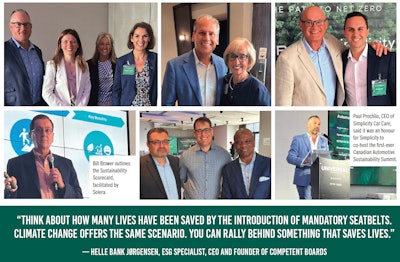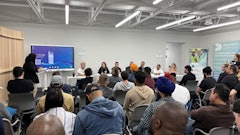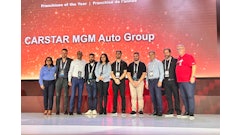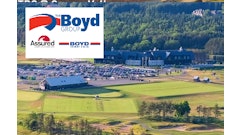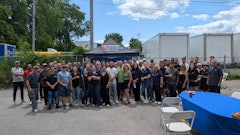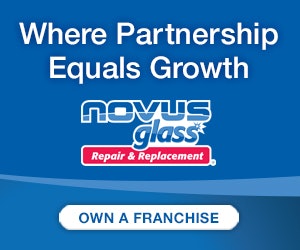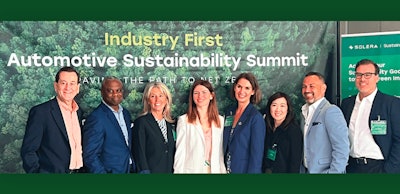
SIMPLICITY CAR CARE AND SOLERA HOST FIRST-EVER AUTOMOTIVE INDUSTRY SUSTAINABILITY SUMMIT
Story by ALLISON ROGERS
Buckle up. That was one of the core sentiments at the recent, first-of-its-kind Automotive Industry Sustainability Summit: buckle up and embrace sustainability, before it’s too late for you and your business.
Hosted by Solera | Audatex Canada and Simplicity Car Care, the first-ever Canadian Automotive Industry Sustainability Summit was a jam-packed event; both in the sense that every attendee left with plenty to think about, and that every seat in the house was filled. Attendees included automotive technology suppliers, plenty of insurance reps, network members and media partners, while topics highlighting the event was the joint launch of the Canadian Claims Economy Sustainability Council, an initiative between Simplicity Car Care and Solera | Audatex. Open to all industry collaborators, the purpose of the new council is to identify, discuss and propose solutions to industry problems and ensure a sustainable future for both the insurance and collision repair industries.
Bill Brower, Solera’s senior vice president of global industry relations and North American claims sales, said key pillars will rest in collaborative engagement; the establishment of stakeholder partnerships to address and solve sustainability challenges and leveraging knowledge of key industry experts, government regulators and other sustainability professionals.
Check out more key intel from the event below.
LEADING THE CHANGE
Keynote speaker Helle Bank Jørgensen used Wayne Gretzky’s famed quote to frame her presentation.
“I want you to skate to where the puck is going to be. We can’t say, ‘Let’s wait until we have environmental regulations, or ‘Let’s wait until we see the effects of climate change,’ because it will be too late.”
Jørgensen, founder and CEO of Competent Boards, is an ESG analyst who has consulted companies like IKEA, Lego, Shell and Walmart on sustainability strategies. She likened the current shift toward more environmentally sustainable practices to the introduction of mandatory seatbelt-wearing, which hit Canada in the mid-1970s.
“Think about how many lives have been saved by the introduction of mandatory seatbelts,” she said, emphasizing that it was insurance representatives that originally rallied for the law. “Climate change offers the same scenario. You can be leaders in this change, and you could also rally behind something that saves lives.”
Jørgensen pointed out that younger generations are partial to sustainability efforts—something to consider from a recruitment and customer service perspective.
“Let’s look at who our customers will be three years, five years and ten years from now. What about the employees you’ll be hiring three years, five years, ten years from now? We need to consider this.”
The top actions businesses can take to lead a sustainable shift into sustainability, according to Jørgensen, are firstly, to “get started.” “It would be a stupid thing to just wait and see, because this is really happening.”
She also stressed the power of collaboration, and said businesses should “get back to the data and understand” factors related to sustainability. “You need to move forward on a path that gets you where you want to be with your sustainable goals.”
For companies that think such strategies seem benign, Jørgensen suggests a more blunt approach and “think like an activist.” “Sit down with your team and think…’what could kill this company?’ Engage. The best think you can do is discover what is important. Then, bring each issue up and work out the logistics, one by one.”
GREENHOUSE GAS GRADINGS
Brower took the stage at the summit to discuss the management of carbon emissions in the claims economy. Another interesting tidbit for the crowd: 11 bumper repairs can equate to -236 kilograms carbon emissions reduction, which is equivalent to four tree seedlings grown over ten years.
Relating to Jørgensen’s insights on the youth’s attraction to businesses with sustainable practices, Brower showed data dictating that 76 percent of consumers would discontinue a relationship with companies that treat the environment “poorly.” Further, 80 percent of global investors believe the way a company manages environmental social governance (ESG) risks is an important factor in their investment decision-making. He also introduced a new sustainable scorecard for collision centres and insurance businesses of all kinds to measure their carbon neutrality. The scorecard data will be benchmarked and measured against Solera’s global data hub and greenhouse gas protocol standards, empowered by AI learning, to measure, analyze and decide opportunities where a company can reduce and offset their emissions.
A PANEL FOR YOUR THOUGHTS
An executive insurance panel featuring Michelle Li, VP of planning, performance and business partnering at Aviva; Alena Kharkavets, VP of supply chain claims at Intact Insurance; Paul Reichert, senior director of MSO and insurance at LKQ Corporation and Paul Prochilo, CEO at Simplicity Car Care, provided some insight on repair versus replace practices, the importance of a sustainable future in the industry and educating the sector on what needs to be done. Prochilo emphasized that Simplicity Car Care repairs vehicles wherever possible, which significantly reduces the company’s carbon footprint.
“In the cases we cannot repair a part— that’s where the use of green recycled parts is key. It reduces our carbon footprint by 42 percent,” he said. Reichart said LKQ is taking sustainability “very, very seriously.”
“There is no closed door for us at LKQ,” he said, specifying that everyone in the industry is welcome to discuss sustainability efforts with the company, should they reach out to Reichart to facilitate.
Kharkavets made the startling note that modern-day plastic bumpers can take more than 500 years to break down in the landfill. “For too long, we’ve focused on a onedimensional view of the claims process,” she added.
Li said that, in a perfect world with the ideal sustainable vision, there would be a set of standards.
“I would love if we could get some sort of standardized data—a consistent methodology for all of us to work together, so we’re singing the same song.”
“To pave this path and host the first-ever Automotive Sustainability Summit for the aftermarket in Canada, it is a true honour,” Prochilo told Collision Repair magazine. “Sustainability in the automotive aftermarket has been at the forefront of Simplicity Car Care’s efforts and we’re proud to spread our vision across the industry in this exciting partnership with Solera | Audatex Canada.”
